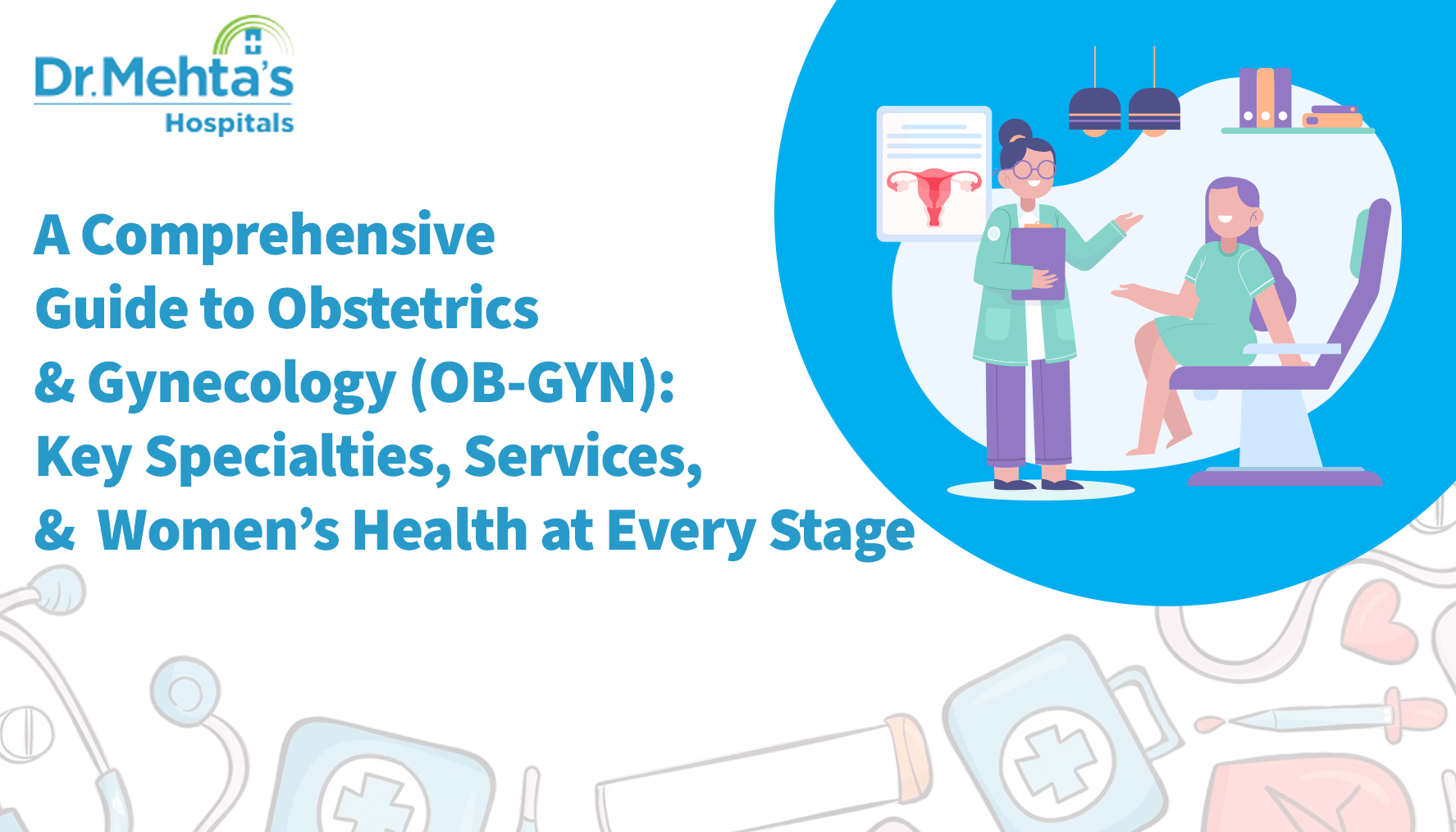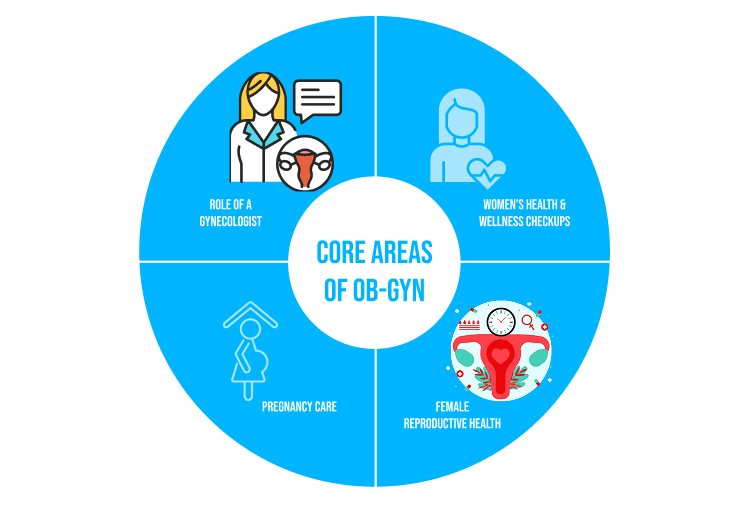Table of Contents

A woman’s health evolves through different stages of life—adolescence, pregnancy and motherhood, and menopause. Each phase brings unique needs and challenges that extend beyond physical well-being, encompassing emotional, hormonal, and reproductive health.
Obstetrics and Gynecology (OB-GYN) play a central role in guiding women through these transitions, offering care that supports both immediate concerns and long-term wellness.
Addressing women’s health at every stage empowers them to manage medical needs while living with confidence, energy, and balance.
This guide explores the key specialties, services, and areas of focus within OB-GYN, highlighting its role in safeguarding women’s health across a lifetime.
What is Obstetrics? & What is Gynecology?
Before discussing the specialties, it is essential to know what obstetrics and gynecology are. Obstetrics focuses on pregnancy, delivery, and the care of newborns, while gynecology deals with women’s reproductive health at every stage of life. Together, they form the foundation of women’s healthcare.
At its core, OB-GYN care guarantees women the appropriate medical care when it comes to their most essential health milestones, whether it is bringing new life into this world or addressing reproductive issues.
Women face unique health concerns that require specialized attention. Routine OB-GYN care provides early detection, preventive exams, and customized care that safeguards long-term health.
The National Family Health Survey-5 (2020-2021, India) reveals that only 58.6 percent of women aged between 15 and 49 years had access to complete antenatal care during pregnancy. This is why organized OB-GYN support is exceptionally crucial.
OB-GYN care goes beyond treating conditions—it helps women achieve healthier, more fulfilling lives at every stage.
An OB/GYN specialist is a significant health partner throughout life. They are trained to provide care, from routine health checks and pregnancy management to advanced surgical procedures when required.
These experts bridge the gap between prevention and treatment, helping women manage current issues while safeguarding future health. OB/GYNs are one of the most trusted professionals in women’s healthcare, as they can visit them to receive preventative care, reproductive planning, symptom evaluation, and advanced treatment. Many people still wonder about the difference between the two roles. If you’re unclear, here’s a helpful guide on how obstetricians and gynecologists differ.
Meet our skilled OB-GYN specialists in Chetpet, who are committed to delivering personalized and compassionate care at every stage of life.
OB-GYN care is immense, and it has sub-specialties to address highly specific health needs of women. All the sub-specialties guarantee that patients are provided with specialized knowledge and treatment options.
This is the specialty dealing with high-risk pregnancies. Doctors treat such conditions as gestational diabetes, preeclampsia, and ectopic pregnancy, and pay attention to the mother and the baby. Their goal is to achieve safe results even in the most complicated cases.
Women need early detection and specialized treatment of cancer. Gynecologic oncologists treat ovarian, cervical, and uterine cancers and may perform surgery in conjunction with preventive tests, such as Pap smears and HPV tests.
The specialty addresses urinary incontinence, pelvic organ prolapses, and pelvic floor dysfunction and provides both surgical and non-surgical options to restore quality of life.
Modern OB-GYN uses advanced methods like laparoscopy and hysteroscopy, which reduce pain, recovery time, and scarring while improving outcomes for patients undergoing reproductive procedures.
Gynecological concerns can also appear in children and adolescents. Pediatric gynecology deals with menstrual health, issues related to puberty, and early-onset disorders.
OB-GYN doctors assist women during perimenopause and menopause, and they can provide hormonal and non-hormonal medications to relieve hot flashes, mood disorders, and bone health concerns.
OB-GYN care assists women with informed reproductive choices, including contraception (IUDs, pills, implants), pre-conception planning, and pregnancy. Fertility preservation methods and abortion services are also included in this specialty.

These are the major areas that describe the most prevalent services offered by OB-GYN specialists and they span the entire scope of healthcare requirements of women.
Regular tests such as pap smears, breast exams, and preventive screenings are essential in identifying problems early. Family planning and management of menopause also form part of these checkups.
Fibroids, endometriosis, and PCOS are prevalent in Indian women. The prevalence of PCOS in India is reported between 3.7 and 22.5 percent using different diagnostic criteria. Proper management improves quality of life and fertility.
OB-GYN specialists also advise pregnant women on antenatal checkups, nutrition, monitoring of the fetus, and delivery preparation. Expectant mothers often need guidance beyond regular checkups, from dietary plans to preparing for delivery. Preparing maternity essentials in advance can make the pregnancy journey smoother.
Preventive health requires annual visits to a gynecologist. They handle infections and menstrual irregularities as well as surgical procedures when necessary.
Pregnancy is one of the most critical events in a woman’s life. Obstetricians are making sure that this journey is safe, in terms of prenatal, delivery, and postnatal care. Choosing the right maternity hospital is a key decision that can greatly impact safety and comfort during delivery.
Prenatal care promotes the health of the mother and the unborn child between the first and third trimesters of pregnancy. Other conditions, such as gestational diabetes and preeclampsia, need early management.
OB-GYN specialists assist women in making decisions such as normal birth, C-section, or VBAC (Vaginal Birth After Cesarean). They also offer pain-relieving services like epidurals.
Pregnancy may sometimes present rare but critical complications such as miscarriage or placenta previa, which require delicate and expert care. At our immediate care centre, women in such critical moments have access to 24/7 emergency support.
d. Postnatal Care
The journey doesn’t end at childbirth; mothers often face unique struggles with feeding their newborns. Reading about common breastfeeding difficulties can provide reassurance and practical solutions
Gynecology is a vast field that deals with a wide variety of conditions that are not directly related to pregnancy, but which maintain the reproductive health of women at every stage of their lives.
PCOS, endometriosis, and heavy bleeding are typical issues. Early treatment improves overall health and fertility.
Gynecologists support women in making informed reproductive choices, offering contraception guidance and advanced procedures like hysterectomy or fibroid removal when necessary.
Concerns about sexually transmitted infections, vaginal infections, and pain during intercourse are essential to the physical and emotional health of women.
Preventive care may involve HPV vaccination, Pap smears, and mammograms, which can significantly decrease the chances of having cervical and breast cancer.
OB-GYN is about preventive care and provides surgical expertise when needed, ensuring women receive complete support.
In this case, the detailed list of surgeries will be as per your structure, e.g., Hysterectomy, Oophorectomy, Laparoscopy, Robotic surgeries, Cancer-related surgeries, etc., which are already in the draft, so I will not retype the long surgical lists unless you wish me to refine them further.
These are the surgeries that deal with the most frequent reproductive health issues and are commonly prescribed when lifestyle changes or medications are not sufficient.
The doctors can now conduct surgeries with minimal cuts, which is less painful and takes a shorter time to heal.
According to Indian cancer registries, the five-year survival for cervical cancer is around 51.7%. This highlights the importance of early detection and timely surgical intervention in cervical cancer. In women with diagnosed gynecological cancers, surgery is an essential component of treatment.
These surgeries assist women in coping with ailments that can impact everyday comfort and dignity.
These procedures are customized to women who need to enhance or rebuild fertility.
Some of the pregnancy complications would require surgical management to guarantee the safety of the mother and the baby.
Ob-Gyn is an ever-changing field that introduces new practices that can enhance women’s health outcomes.
In OB-GYN, technology is changing, particularly in fertility treatment and less invasive procedures.
IVF, IUI, and egg freezing are the solutions for couples with fertility issues. Increased awareness in India has seen more women seeking such treatments at an earlier age.
Modern medicine has provided a combination of both hormonal and non-hormonal treatments that assist women in combating osteoporosis, vaginal atrophy, and other menopause-related problems.
Women’s health requires care at every stage of life. OB-GYN specialists are critical in helping a woman through regular checkups, reproductive care, pregnancy, and advanced surgical work between adolescence and menopause. Today’s OB-GYN care is more advanced and reassuring than ever before, with specialties including maternal-fetal medicine, gynecologic oncology, and more.
Dr. Mehta Hospitals are all about caring, evidence-based, specialized healthcare that enables women to lead healthier, more fulfilling lives. With years of experience in women’s health, our OB-GYN team is ready to guide you through pregnancy planning, preventive care, and specialized treatments. Contact us to start your journey
If you’re seeking expert OB-GYN care in Velappanchavadi, connect with Dr. Mehta’s Hospitals today and let us guide you with care and expertise.
Table of Contents
Recent Post
About us
Dr. Mehta’s Hospitals is a leading multispecialty hospital in Chennai with over 90 years of excellence. With 400+ beds and 80+ specialties, its Chetpet and Velappanchavadi centers offer advanced, state-of-the-art, compassionate care under one roof.
Chetpet Contact Details
Velappanchavadi Contact Details
Feel free to ask your queries on
Our Specialities
About us
Dr. Mehta’s Hospitals is a leading multispecialty hospital in Chennai with over 90 years of excellence. With 400+ beds and 80+ specialties, its Chetpet and Velappanchavadi centers offer advanced, state-of-the-art, compassionate care under one roof.
Chetpet Contact Details
Velappanchavadi Contact Details
Feel free to ask your queries on
Our Specialities
Quick Links
Center Of Excellence